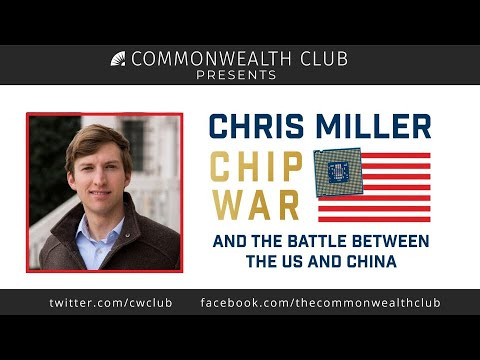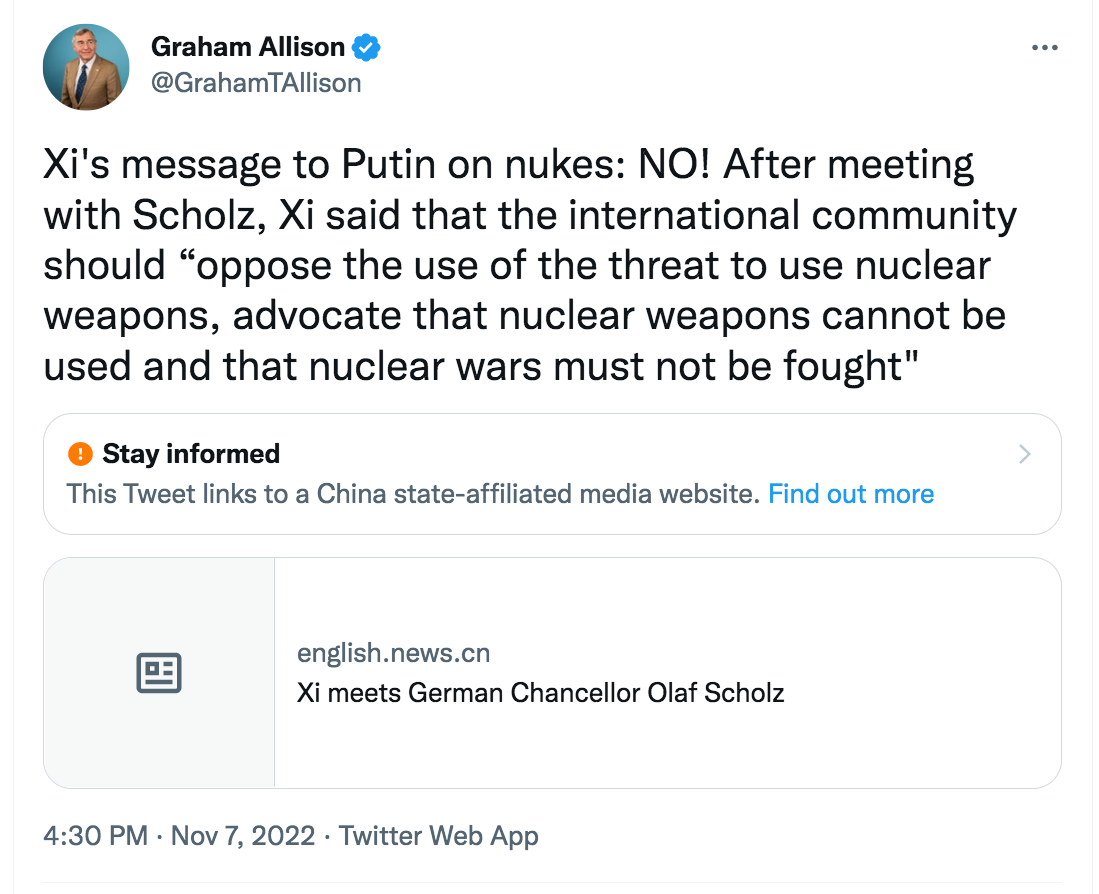Why are 90% of the world’s advanced semiconductors produced in Taiwan?
I think the single best/most important interview I’ve listened to in months…
Clip for 4 minutes. Though the discussion from here on (the latter 40 minutes) really is excellent.
44:30 – Are we risking a re-run of Pearl Harbor?
48:10 – If China were to invade Taiwan, could China just take over TSMC?
The one question that I wish had been put to Chris Miller...
China contributes 15–35% of revenue for leading non-Chinese semiconductor companies.
By the U.S. largely prohibiting advanced chip sales to China, are non-Chinese firms going to have sufficient profits to reinvest to stay five-plus years ahead? Do the new export controls not severely handicap non-Chinese firms’ capital expenditure abilities to keep advancing, which Biden’s subsidies simply won’t make up for?
For anyone interested: for a quick yet rounded history of the founding of the semiconductor industry, with a visual of some of the characters, I highly recommend the American Experience documentary Silicon Valley.
U.S. Ambassador to China: how are discussions?
Despite rhetorical bluster, in this role we have someone who’s tactfully engaged in discussions, right?
Nicholas Burns, the U.S. Ambassador to China, ought to be the primary global figure making efforts to broker peace.
It’s interesting to hear from him that a) channels of communication really have broken down, and [two clips spliced together below] b) he’s taking an historically atypical approach to diplomacy – earnestly trying to reach in and converse with the Chinese people.
Is this diplomacy? Is this the role of a U.S. Ambassador?
Contrast Burns’s approach today with diplomacy of the 1960s; JFK’s Ambassador to Japan (then the rising, intimidating Asian power), Edwin Reischauer – who I featured in my last update – who made strenuous efforts to further mutual understanding.
Reischauer produced scholarly works and conducted educational seminars that were directed at improving US cultural understanding of Japan.
Reischauer was appointed US Ambassador to Japan by President John F. Kennedy in the spring of 1961, at a time when US-Japan relations were at a low point following the massive 1960 protests in Japan against the US-Japan Security Treaty. In the immediate aftermath of the protests, Reischauer had traveled to Japan and spoken with various Japanese friends and associates to get a Japanese point of view on the protests. After returning to the United States, Reischauer attracted the attention of Kennedy’s transition team when he wrote an article about the protests in the prominent policy journal Foreign Affairs called “The Broken Dialogue with Japan.” In this article Reischauer rejected the notion, put forth by the Eisenhower administration, that the protests had been a communist plot. Instead, he argued that the protests reflected real grievances on the part of the Japanese in relation to US, and were exacerbated by a failure by American leaders to reach out to Japanese opinion leaders and try to understand Japanese concerns. Reischauer argued forcefully that only skillful and nuanced diplomacy could repair this “broken dialogue.”
Further, Burns appears to have thrown out JFK’s edict of a ‘world safe for diversity’ – recurrently put forward today by Graham Allison:
‘[In 1963] President John F. Kennedy delivered one of the most significant speeches of his career. (Both his close colleague and speechwriter Ted Sorensen and his Secretary of Defense Robert McNamara regarded it his single most important speech.) In the commencement address at American University, he declared that hereafter, the United States’ goal would be to build “a world safe for diversity.”
Say what? No, this was not about ensuring fairer representation of minority rights. It was about what the United States should require in relations with its deadliest adversary. In a feat of rhetorical jujitsu, he stood Woodrow Wilson’s call for a “world safe for democracy” on its head. More importantly, he rejected its Cold War analogue of which he had been a leading advocate. Rather than demanding that the United States bury Soviet-led Communist totalitarianism, the United States should now live and let live—in a world of diverse political systems with diametrically opposed values and ideologies. In that world, the Free World and Evil Empire could compete vigorously—but only peacefully—to demonstrate whose values and system of governance could best meet the demands of its citizens.’
Are the Chinese beginning to sound more diplomatic than the Americans?
A more recent share from Graham Allison…
I am by no means pro-China in this contest, but does the following not sound much more conciliatory/reasonable than anything coming out of the U.S. administration?
‘The two leaders also exchanged views on the Ukraine crisis. Xi reaffirmed China’s support for Germany and Europe to play an important role in facilitating peace talks and to build a balanced, effective and sustainable security architecture in Europe. Under the current circumstances, the international community should support all efforts conducive to the peaceful settlement of the Ukraine crisis and call on relevant parties to remain rational and exercise restraint, start direct engagement as quickly as possible, and create conditions for the resumption of talks; oppose the use of or the threat to use nuclear weapons, advocate that nuclear weapons cannot be used and that nuclear wars must not be fought, and prevent a nuclear crisis in Eurasia; work together to keep global industrial and supply chains stable and forestall disruption to international cooperation in energy, food, finance and other areas and consequent damage to global economic recovery, especially the economic and fiscal stability of developing countries; and make joint efforts to tide civilians in areas affected by the crisis through the winter, and improve the humanitarian situation to avoid a humanitarian crisis on a bigger scale.’
This isn’t what I imagine when I think ‘China state-affiliated media’. One can of course question the sincerity of its source, but why are U.S. diplomats (or Presidents) not putting forward this kind of aspirational sentiment?
Cinéma vérité – Kennedy vs. Wallace: A Crisis Up Close
Staying with JFK, I watched a 1963 documentary, Kennedy vs. Wallace: A Crisis Up Close. It’s incredible. All raw footage. Almost no voiceover/narration. But you’re sat with JFK and his five or so most intimate advisors, in the White House, listening to their deliberations.
You also follow (with equal filmmaking intimacy) Alabama governor George Wallace, who was intending personally to block the entrance of two black students to the all-white University of Alabama (the last university in the U.S. to integrate), who JFK had to threaten to bring his own National Guard against (risking losing support for civil rights legislation in so doing).
This is a remarkable documentary.
One thing that stood out to me was how calm it all was. High stakes, but calm.
Rather than pull out a clip of the documentary (for anyone interested, it’s worth watching in full), the story of how such intimate, behind-closed-doors White House access came to be is fascinating…
This was the first film ever shot of a president doing real work in the White House, and it’s said no other independent filmmaker has been inside the Oval Office recording a president actually making decisions like this.
‘Kennedy himself grasped that the technique could create a new form of history, once musing to Robert Drew [the filmmaker] that he wished he could have observed FDR in the 24 hours before he declared war on Japan.’
I’m glad that our new PM’s camera team are capturing so much footage, and are hopefully aware of this.
How are oil companies making such profits?
This is something I didn’t understand.
With lots of discussion of windfall taxes, I consider it important to understand the underlying incentives, and why/how profit margins are actually going up. I found the following a helpful explainer…
Vision for a new institute
Taken from a terrific read from fellow 2020–21 No10 ‘misfit’, James Phillips, on applying history in R&D/science…
One of the guiding lights of our Number Ten science and technology team was that there are examples of transformative science and technology organisations in the past that hold lessons about how to do transformative research that have been forgotten.
…learning from major historical examples of outlier success – Bell labs, Xerox PARC and the Cambridge LMB.
A personal favourite lesson:
The flat hierarchy and small labs meant that focus was on research, not career progression: don’t convert first class researchers to 2nd class administrators.
And:
We further believe that the notion of what constitutes research in universities is overly constrained, and that blue skies invention without obvious immediate application has historically been a major driver of progress yet is not well funded by public R&D nor rewarded in academia.
What Republicans (and Democrats) should do on taking the House
From two weeks ago, this is a minute worth closing your eyes and listening to. Beautiful from Niall Ferguson…
Westminster works
Is Westminster, for all that’s happened the past few months, the laughing stock of the world? It shouldn’t be, it’s working, argues Andrew Neil. Powerful opening to his show…
Last thing…
Ready yourself; it looks like Trump is going to announce he’s running this coming Tuesday…

I wonder what the announcement could be…
*
Thanks for reading. If you can think of one person who might enjoy this, please share it on!






A few additional bits on cinéma vérité / Crisis (cut from above for brevity)...
‘Robert Drew had a vision for a new kind of film, one that captured the drama of real life to allow viewers a direct experience of other worlds.
‘...the camera follows people freely through their stories and the footage is edited to convey the sense of what it was like to be there.
‘Filmed in what was then a revolutionary style that came to be known as American cinema verite… the birth of what we think of as the modern documentary.
*
‘Using force on the Governor could destroy support Kennedy needed to further civil rights legislation. But allowing the Governor to block the students could set back the civil rights movement.
‘I also knew that this new form required new technology—a mobile, quiet camera that could synchronize with a sound recorder. But I had always assumed that the technology arose first and then filmmakers and artists found uses for it. What I learned while working on this release was the extent to which the opposite was true: Robert Drew and his fantastic team of filmmakers (Richard Leacock, D. A. Pennebaker, Albert Maysles, and Terence Macartney-Filgate) had a clear vision of the kind of documentary they wanted to make, and they had to commission the development of a camera to realize that vision.
‘Broadcast television executives did not know what to make of this documentary that featured occasionally blurry in-the-moment camerawork, did not lecture to its audience with a voice-over narration, and did not sum up its thesis with a moral.
“We had this remarkable movie that we were about to shoot and could not sell it going in, up front; the networks didn’t want to touch it”
‘Kennedy had in fact gone into office exclusively focused on foreign policy... Richard Reeves notes that the first draft of Kennedy’s inauguration speech (with the famous “ask not what your country can do for you” line), there wasn’t a single word devoted to domestic policy.’